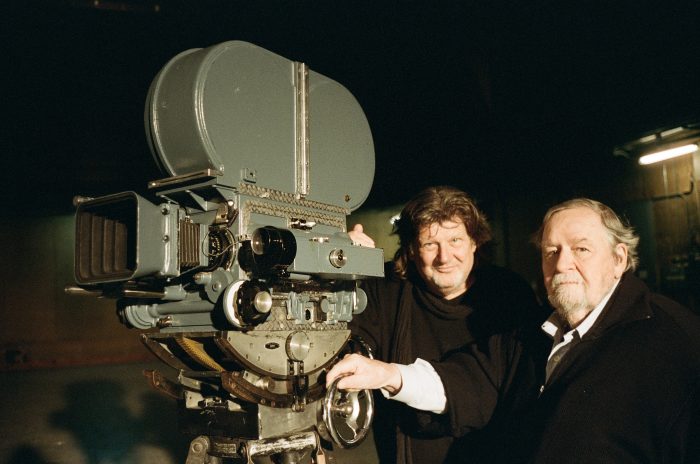
October 5, 2017 – Montreal – National Film Board of Canada (NFB)
Labrecque, une caméra pour la mémoire, a feature documentary by Michel La Veaux, will have its world premiere at the 36th Festival du cinéma international en Abitibi-Témiscamingue (FCIAT) in Rouyn-Noranda, Quebec, with the director—a friend and regular patron of the festival—in attendance. Chronicling a genuine encounter between renowned Quebec filmmaker/cinematographer Jean-Claude Labrecque and La Veaux, an acclaimed Quebec cinematographer (Le démantèlement) and director (Hôtel La Louisiane), the film captures Labrecque’s passionate, humanistic perspective on the films, culture and history of Quebec. Labrecque, une caméra pour la mémoire is produced by Nicole Hubert with executive producer Bernadette Payeur for the Association coopérative de productions audiovisuelles (ACPAV) and co-produced by the NFB, with Nathalie Cloutier as producer and Colette Loumède as executive producer. The film screens on Sunday, October 29, at 2:20 p.m. at the Théâtre du Cuivre and is in competition for two awards at the festival, which runs from October 28 to November 2, 2017. Labrecque begins a theatrical run at the Cinémathèque québécoise on January 12, 2018.
About Labrecque, une caméra pour la mémoire (90 min)
A genuine encounter with filmmaker Jean-Claude Labrecque, this feature-length doc underscores not only the importance of his work (especially in the documentary medium) but also his passion for film. The bond between Labrecque and director Michel La Veaux allows us to see beyond the images and discover the smaller story hidden within the larger one. La Veaux shares with us his own love for film and the humanistic perspective from which Labrecque has used his camera to etch the great moments of Quebec’s culture and history into Quebecers’ collective memory.
As Bernadette Payeur, executive producer of the film for ACPAV, explains, “For over 45 years, ACPAV has been producing auteur films with a special emphasis on thought-provoking work about Quebec society. In light of this track record, we considered it essential to support Michel La Veaux in this encounter with filmmaker Jean-Claude Labrecque, who has chronicled Quebec’s history for the past 50 years. The resulting film highlights Labrecque’s perseverance and his passion for films and images of Quebec, and conveys the important role he’s played as a keeper of our collective memory.”
About Michel La Veaux
Michel La Veaux has been recording images for documentary and fiction films for more than 25 years. His sensitive eye and dedication to creating meaningful images have earned him national and international recognition. He was a finalist for the Jutra Award for best cinematography in 2011 (for Trois temps après la mort d’Anna, by Catherine Martin) and 2012 (for Pour l’amour de Dieu, by Micheline Lanctôt), and won this award in 2014 for his work on Le démantèlement, by Sébastien Pilote. In 2015, La Veaux directed Hôtel La Louisiane, his first feature-length documentary, which was well received by critics and audiences alike. In 2016, he was director of photography for Benoit Pilon’s Iqaluit and Guy Édoin’s Exilés (his first collaboration with that director). La Veaux has just finished shooting La disparition des lucioles, his third film with director Sébastien Pilote. Labrecque, une caméra pour la mémoire is the second documentary feature La Veaux has directed.
About Jean-Claude Labrecque
Born in 1938, Jean-Claude Labrecque has created a significant body of work and served as an astute, passionate witness to Quebec’s culture and history. Since 1965, he has directed some 40 documentary and fiction films, including the triptych Nuit de la poésie (1970/1980/1991), Marie Uguay (1982), À hauteur d’homme (2003) and Infiniment Québec (Forever Quebec) (2008). He received a Jutra-Hommage for Lifetime Achievement in 2008. His most recent film, Sur les traces de Maria Chapdelaine (Remembering Maria Chapdelaine) (2014), explores the theme of memory, which recurs so often in his work.
–30–
Related Products
Excerpt (in French only): https://vimeo.com/236761436/a0d2b7e7ae
Associated Links
Association coopérative de productions audiovisuelles (ACPAV)
Festival du cinéma international en Abitibi-Témiscamingue
Théâtre du Cuivre
Cinémathèque québécoise